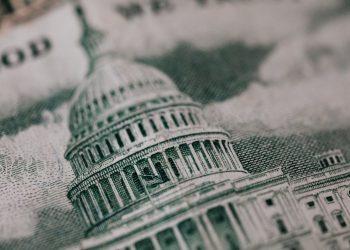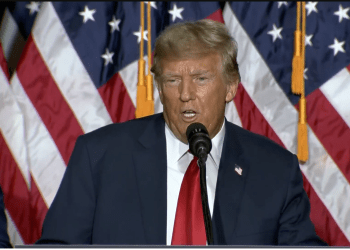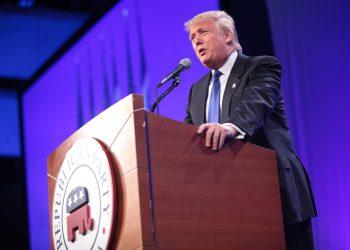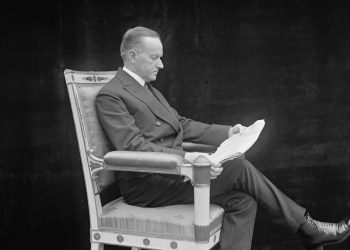Vivek Ramaswamy, who is running for the Republican presidential nomination, has made reviving America’s national identity as a priority. Ramaswamy is calling for a “national revival” and calling for Americans to renew their faith in the principles of the American Founding. In other words, Ramaswamy is arguing for a return to American exceptionalism.
“For we must consider that we shall be as a city upon a hill. The eyes of all people are upon us” is just one part of John Winthrop’s sermon, A Modell of Christian Charity delivered in 1630. Winthrop was one of the founders of the Massachusetts Bay colony and would serve as Lieutenant Governor and later Governor of the colony. Winthrop was a leader of the Puritans who colonized Massachusetts Bay and his sermon was based upon the Puritan Calvinist theology. Nevertheless, his phrase “we shall be as a city upon a hill” has also become a part of American political thought, especially in regard to American exceptionalism.
Defining American exceptionalism is not an easy task because it has changed throughout our history. Today, especially with many progressives and liberals, the idea that the United States is an exceptional nation is outright rejected. This reflects the deepening cultural and political divisions within the country. Americans are not just divided on questions of economic and foreign policy, but also cultural and religious issues.
Anders Edwardsson in Radical Betrayal: How Liberals & Neoconservatives Are Wrecking American Exceptionalism traces the historical development of American exceptionalism and how it has changed throughout our history. Further, Edwardsson argues that the traditional view of American exceptionalism or Americanism as defined by the Founding Fathers has been undermined as a result of political ideology from both the political left and right, and the result has contributed to the current division within the country.
In his Lyceum Address in 1838, a young Abraham Lincoln spoke about the “political religion of the nation.” The political or civic religion that Lincoln referred to was centered on the Declaration of Independence and the Constitution. Lincoln argued that Americans must not only understand but cherish the Declaration and the Constitution. Just as with today, Lincoln saw the division within society, especially the growing tensions and violence over the issue of slavery. The most famous part of Lincoln’s speech was his warning. “If destruction be our lot, we must ourselves be its author and finisher. As a nation of freemen, we must live through all time, or die by suicide,” stated Lincoln. Lincoln was arguing that America’s demise would not be the result of a foreign foe, but from our own actions.
Edwardsson argues that American exceptionalism or Americanism was a “glue” that untied Americans regardless of economic, social, or political differences throughout most of history. This does not mean that Americans agreed on political, economic, or constitutional issues. The United States fought a bloody Civil War over constitutional issues. Nevertheless, Edwardsson argues that the principles established by President George Washington created a unifying view of American exceptionalism that lasted until the emergence of the Progressive Movement and later the Cold War.
Under President Washington these principles included a non-interventionist foreign policy, a system of capitalism based upon Alexander Hamilton’s economic policies, and a commitment to limited government. Granted debate existed over these issues such as the tariff, states’ rights, and what limited government meant. Washington believed that the United States would be an example of liberty to other nations, while avoiding the entangling alliances that led to multiple conflicts and wars in Europe.
The first challenge to this view of American exceptionalism occurred in the realm of foreign policy with the Spanish-American War. In this war, Edwardsson argues that President William McKinley departed from the non-interventionist foreign policy of Washington and neglected the wisdom of John Quincy Adams who stated in 1821, “We Americans do not go abroad in search of monsters to destroy.”
The Spanish-American War opened the doors to American foreign policy interventionism and empire. On the domestic front, Edwardsson argues that another departure from American exceptionalism was the Progressive movement. The Progressive Movement of the early 20th Century argued that the Constitution and the principle of limited government was obsolete and could not govern a modern industrial society.
Progressives such as President Theodore Roosevelt, Woodrow Wilson, and Franklin D. Roosevelt, not only embraced an internationalist foreign policy, but advocated a more energetic federal government with vastly expanded powers. Progressives argued that the Constitution was Darwinian, that is, a living document that changes with the times.
President Wilson was the greatest catalyst for changing American exceptionalism. Wilson, even as an academic, was extremely critical of the American Founding. His foreign policy was also idealistic and internationalist. Wilson was the first “globalist” to serve in the White House. In the aftermath of World War I, Wilson, through his League of Nations, envisioned not only a new international order, but the United States would become a leader in promoting democracy. In Wilson’s vision the United States would not just be an example to other nations, but actively promote democratic values. In addition, Wilson argued that the United States needed to abandon the traditional protectionist trade policy of using tariffs and embrace free trade.
Edwardsson argues that Wilson’s view of American exceptionalism was curtailed during the 1920s by the presidential administrations of Warren G. Harding, Calvin Coolidge, and Herbert Hoover. Whereas Wilson was critical of the Founding, Harding, Coolidge, and Hoover adhered to the Founders and the Constitution. Harding’s election in 1920 ushered in a period of conservatism. It has been argued that conservatives during the 1920s “worshiped” the Constitution.
As an example, Harding highly espoused the Founders and the Constitution, which he described as “the very base of all Americanism, the ‘Ark of the Covenant’ of American liberty, the very temple of equal rights.” Harding also stated that “it is good to meet and drink at the fountains of wisdom inherited from the founding fathers of the republic.” Coolidge and Hoover held similar views.
Harding not only believed in America First, but he argued for a return of Americanism in policy. As Harding stated:
I like to rejoice in an American conscience; and in a big conception of our obligation to liberty, justice, and civilization–aye, and more. I like to think of Columbia’s helping hand to new republics which are seeking the blessings portrayed in our example. But I have a confidence in our America that requires no council of foreign powers to point the way of American duty. We wish to counsel, cooperate, and contribute, but we arrogate to ourselves the keeping of the American conscience, and every concept of our moral obligation. It is time to idealize, but it’s very practical to make sure our own house is in perfect order before we attempt the miracle of Old World stabilization. Call it selfishness of nationality if you will, I think it an inspiration to patriotic devotion– to safeguard America first, to stabilize America first, to prosper America first, to think of America first, to exalt America first, to live for and revere America first. Let the internationalist dream and the Bolshevist destroy.
Harding, Coolidge, and Hoover also fought to preserve constitutional limited government and they returned to a non-interventionist foreign policy. All three supported the use of the tariff to protect America’s economy. Harding and Coolidge were also successful at limiting government by cutting government spending and reducing tax rates. Harding, Coolidge, and Hoover believed in the traditional view of American exceptionalism that the United States should serve as an example, just as Washington stated, and not as an agent of exporting democracy and American values.
The situation changed with the Great Depression and the election of Franklin D. Roosevelt in 1932. Roosevelt’s New Deal was the fulfillment of progressive political philosophy. The New Deal not only changed the way Americans viewed government, but it resulted in a constitutional revolution. The New Deal was the death knell of limited government.
Roosevelt also ushered in Wilson’s internationalism with the start of World War II. Roosevelt ended non-interventionism or what internationalist argued was “isolationism.” As a result of World War II, the United States became involved in military alliances such as NATO and Roosevelt ended the Hamiltonian system of economic nationalism by embracing global free trade.
Edwardsson notes that during the Cold War presidential administrations, both Republican and Democrat, used American exceptional rhetoric as a weapon to fight communism. Nevertheless, the Cold War meant a permanent departure from Washington’s non-interventionism. It also created the “warfare-welfare state.” This meant that the federal government would not only be increasing defense spending, providing more foreign aid, but also expanding the domestic regulatory and welfare state that had begun with the New Deal. The best example of this was President Lyndon B. Johnson’s Great Society that saw an expansion of the welfare state, along with increased defense spending in order to fight the war in Vietnam.
It is during the Cold War that Edwardsson describes the rise of two political ideologies that he argues helped lead to the current decline and division within the country today. The first, was the Progressives or modern liberals who embraced the philosophy of Wilson and Franklin D. Roosvelt. This ideology became more extreme especially in the 21st Century in its criticism of the principles of the American Founding and even outright rejecting American exceptionalism, which is even a departure from older progressives such as Wilson and Roosevelt.
The second ideology came from the political right. Edwardsson argues that the Neoconservatives within the Republican Party embraced a Wilsonian view of American exceptionalism. The Neoconservatives were actually former Democrats who bolted the party and joined the Republican Party as a result of the increasing social radicalism being supported by Democrats and the “dovish” foreign policy represented by Senator George McGovern.
The Neoconservatives would become prominent fixtures in President Ronald Reagan’s administration and remain a force within the Republican Party. Edwardsson’s chapter on Reagan is interesting because the Reagan administration was unique. Edwardsson argues that President Reagan brought forth a renewed patriotism and he often reminded Americans about the principles of the American Founding. Reagan even quoted Winthrop is describing the United States as a “city upon a hill.” Reagan, just as with Harding, Coolidge, and Hoover, praised the Founding Fathers and the principles of the American Founding.
Nevertheless, Edwardsson notes that Reagan’s presidency did not restore the traditional view of American exceptionalism. The United States continued on its path of interventionism and globalization and even though Reagan ushered in a period of economic growth; he failed to limit the welfare state.
Edwardsson is critical of the Neoconservatives for their embrace of interventionism and globalism, but also for their support for “big government conservatism” and supply-side economics. The supply-siders argue that cutting tax rates will not only lead to economic growth, but actually create enough revenue to pay for themselves and reduce the debt. However, as Edwardsson notes, the tax cuts were never combined with spending reductions, which led to greater levels of debt and deficits.
The Neoconservatives were also influential in the foreign and domestic policies of Presidents George H. W. Bush and George W. Bush. President George H. W. Bush in the aftermath of the fall of the Soviet Union declared a “new world order” and he also embraced “big government conservatism” and global free trade. During the 1990s globalization became an ideology as Republicans and Democrats, led by President Bill Clinton, embraced an interventionist foreign policy, global free trade, and the expansion of the federal government. Free trade agreements were embraced by both political parties during the 1990s and this also led to the support of granting China MFN or most-favored-nation status. A decision that opened our markets to China.
Both parties made a golden idol out of free trade and this market fundamentalism had dire consequences. It also led to the belief that opening America’s market to China would result in a more ‘democratic” China. The results have been devastating and today China has emerged as a dangerous threat to American security. China failed to become the ‘responsible global citizen” that the free-market zealots promised.
Both Republicans and Democrats embraced “the end of history” ideology that with the fall of the Soviet Union and communism that global democracy would now become the norm and the United States had a unique mission to help lead the spread of democracy.
This philosophy was especially predominant in President George W. Bush’s administration. Edwardsson argues that the September 11, 2001, terrorist attacks marked a turning point. As a result of the attacks, President Bush declared a war on terror and with the help of his Neoconservative advisers launched two wars in Iraq and Afghanistan.
“The survival of liberty in our land increasingly depends on the success of liberty in other lands. The best hope for peace in our world is the expansion of freedom in all the world,” stated President Bush in his second Inaugural Address. In echoing Wilson, President Bush argued that it was in the national interest to advance democracy across the globe. Further, the President argued:
Advancing these ideals is the mission that created our Nation. It is the honorable achievement of our fathers. Now it is the urgent requirement of our nation’s security, and the calling of our time. So it is the policy of the United States to seek and support the growth of democratic movements and institutions in every nation and culture, with the ultimate goal of ending tyranny in our world.
The Neoconservative view of American exceptionalism argued that not only was the United States an “empire of liberty,” but our history was based on expanding and exporting democracy. Neoconservatives, just as with the Progressives, also had an optimistic view of human nature, that is, they believed that America was based upon a set of “universal principles,” which were not just found in America, but could be discovered in the hearts of all mankind. This led to the belief that these “universal principles” could be found in any nation with the help of the United States. This led directly to the nation-building foreign policy that the United States could not only promote democracy but create liberal democratic states in countries such as Iraq, Afghanistan, among others.
This view of American exceptionalism was the direct oppositive of the precedent established by President Washington. What was the result of the Neoconservative and the Progressive view of American exceptionalism? In terms of foreign policy, it led to multiple interventions and two major wars in Iraq and Afghanistan, which failed to create the promised democratic states. It also led to the expansion of NATO, which helped cause the current war between Ukraine and Russia. It has also led to instability in other parts of the globe, especially the Middle East. Democracy has failed to bloom in this region.
In terms of domestic policy, it has led to the further expansion of the federal government, which in turn has escalated the national debt to dangerous levels. The free trade and globalization ideology has led to not only a loss of sovereignty to international organizations, but the loss of industry and manufacturing jobs, which previously sustained a healthy middle class. The United States, which had been a manufacturing superpower and a creditor nation, became dependent on foreign and often hostile powers such as China for necessities. The United States has also become a debtor nation symbolized by massive trade deficits.
Globalization also led to the belief that the United States should not only embrace free trade, but also open the borders for increased immigration. Since the 1960s the United States has embraced an “open borders” immigration policy, which has resulted in not only a massive level of immigration but led directly to the border crisis of today. The embrace of globalization and immigration was combined with a belief in multiculturalism. Assimilation and Americanization, which was once a cornerstone of immigration policy, is now ignored and replaced by multiculturalism.
The era of globalization marked by foreign interventionism, democracy promotion, and free trade became the dominant philosophy from President George H.W. Bush through President Barack Obama. Edwardsson argues that a turning point came with the 2016 presidential election and the emergence of Donald Trump.
Edwardsson discusses the controversies and division surrounding President Trump, but he also argues that his victory in 2016 marked a return to a traditional view of American exceptionalism. At first, President Trump and his policies were seen as unorthodox. During the 2016 election both Democrats and Republicans did not take Trump seriously as a candidate.
This was a mistake, argues Edwardsson, because Trump tapped into the concerns of the “silent majority” of Americans. During the campaign Trump argued for a return to an America First policy agenda, which was similar to that of President Harding. The America First campaign centered on the slogan “Make America Great Again.” This agenda included a renewed patriotism, calling for an end to illegal immigration and the building of a border wall, and a non-interventionist foreign policy. Trump was also highly critical of free trade and called for the renegotiation of trade agreements such as NAFTA. It was these free trade agreements, which had led to the outsourcing of manufacturing jobs and the decline of the middle class. During the 2016 and 2020 campaigns, President Trump also utilized patriotic themes and was able to build a political coalition based on his America First nationalism.
Trump’s policy views were considered unorthodox and the direct opposite of the Neoconservative philosophy. Nevertheless, as Edwardsson notes, Trump’s views were actually consistent with the older conservative philosophy of both the Founders and the policies of Harding and Coolidge. In his Inaugural Address, President Trump outlined his philosophy of government, which was a return to a more nationalistic policy:
From this day forward, a new vision will govern our land. From this moment on, it’s going to be America First. Every decision on trade, on taxes, on immigration, on foreign affairs, will be made to benefit American workers and American families.
Further, President Trump signaled the abandonment of the Neoconservative and Progressive philosophy of globalism and democracy promotion. “We will seek friendship and goodwill with the nations of the world – but we do so with the understanding that it is the right of all nations to put their own interests first. We do not seek to impose our way of life on anyone, but rather to let it shine as an example for everyone to follow,” stated President Trump.
This signals back to the traditional view of American exceptionalism that America will lead by example rather than by force. Finally, President Trump argued that a rediscovery of patriotism would renew the American spirit. “At the bedrock of our politics will be a total allegiance to the United States of America, and through our loyalty to our country, we will rediscover our loyalty to each other. When you open your heart to patriotism, there is no room for prejudice,” stated President Trump.
President Trump based his administration on these policies. The national conservatism of the Trump administration was similar to the policies of Harding and Coolidge. A non-interventionist foreign policy, an immigration policy centered on border security and limiting immigration, and the use of tariffs to protect manufacturing. President Trump also stood against globalization by protecting the loss of sovereignty from international organizations and agreements. He also threatened to end America’s membership in NATO unless the other member states started to pay their fair obligations as a member of the pact. For decades, the United States had been subsidizing the defense of Europe, while NATO members took advantage. The same was true for trade. President Trump withdrew the United States from President Obama’s Transpacific Partnership agreement, and he renegotiated several trade deals, most notably NAFTA. He also utilized protective tariffs to support industries such as steel, while being the first President to actually address the threat posed by communist China.
What is the future of American exceptionalism? In the post-Trump era, Edwardsson acknowledges that America is still divided. Although President Trump tried to restore a traditional view of American exceptionalism through his policies he also failed on a few fronts. Edwardsson notes that just as with Reagan, Trump failed to limit the size and scope of government and the national debt has continued to increase at dangerous levels.
Americans are still divided on a variety of policy issues. Many of these divisions are cultural issues, which are not easily resolved. Whether it is abortion, same-sex marriage, the transgender movement, or woke cultural Marxism, Americans are deeply divided. The same is true on other policy fronts such as immigration and foreign policy.
The current debate over funding for the war in Ukraine is an example. Democrats and Republicans, who are members of the “war party,” argue that the war in Ukraine is a turning point in Western Civilization. Many Neoconservatives are comparing this to 1938 and if the United States allows Russia to win the war it will lead to the collapse of democracy and it will leave an open door for Russia to conquer Europe.
The Republican Party is currently divided over foreign policy, and this has become clear on the campaign trail. Former President Trump and Ramaswamy have been clear on opposing additional aid to Ukraine and focusing on an America First foreign policy, while former United Nations Ambassador and South Carolina Governor Nikki Haley is a vocal supporter for increased aid to Ukraine. Haley’s campaign is carrying the torch for the Neoconservatives. Florida Governor Ron DeSantis has made some sympathetic statements to the America First foreign policy, but his campaign has centered more on combatting woke ideology than foreign or trade policy.
Edwardsson argues that America must rediscover the true meaning of American exceptionalism, that is, the principles that were established by President Washington and followed by the Harding, Coolidge, and Trump administrations. He also offers a warning of what will happen if America fails to renew this traditional view of American exceptionalism.
“Moreover, if national and patriotic identities continue to fade, the only unifying force left throughout the West will soon be visible cold hand and army-booted foot of government,” wrote Edwardsson. We are already seeing the consequence of this with not only the growth of the federal government, but also the emergence of the surveillance state symbolized by the “deep state” of government.
Finaly, President Trump brought much needed policy change to both the Republican Party and conservatism, but it is not clear whether or not those policies and ideas will continue. A civil war is emerging within the Republican Party over “Trumpism” and even though America First policies are popular it does not mean that they will continue. President Trump faced much opposition from within the Republican Party during his administration and his policies, especially foreign and trade, threaten the Progressive and Neoconservative globalist agenda that has been in place for decades.
Many Republicans and conservatives view Trump’s America First policies as a dangerous return to the obsolete ideas of protectionism, isolationism, and nativism. As an example, former President George W. Bush has warned about returning to the dangerous America First policies of the 1920s. This has been echoed by other Republican politicians, conservative organizations and thought leaders, and right-of-center publications such as The Wall Street Journal. A recent article in The Wall Street Journal even profiled the individuals who are advising former President Trump and argued that the “Brain Trust” advising the former President is completely aligned with his economic protectionism and isolationist foreign policy.
Edwardsson does see some signs of hope that America will rediscover a traditional view of American exceptionalism. He argues that the second or third generation of immigrants may prove to be more patriotic, and he argues that most Americans have a disdain of the current vile political environment. He also argues for the need for a new constitutional convention or an Article V convention of the states to correct the wrongs of the American Founders.
Many on the political right are arguing for an Article V convention, especially to pass amendments to deal with the national debt and reduce the size and scope of government. The question must be asked whether or not the Founders made a mistake, or did “we” as a nation abandon the principles of the Founding.
John Winthrop and the Puritans can help us answer this question. The Puritans were conservatives and they believed in original sin, that is, that human nature is corrupted. Therefore, no system of government will be perfect. The Founders even understood this, which is why they rejected the system of democracy and created a republic.
An Article V convention should be debated, and it could provide a solution to reign in the out-of-control spending and place limits on the growth of the federal government.
Nevertheless, Edwardsson may be too optimistic. The deep divisions over social and cultural issues will not be resolved. In addition, for decades the American education system has not only failed to teach American History, American Government, and Western Civilization, but often times it has led to the radicalization of education. This is especially true in higher education, but the crisis in civic education is occurring at all grade levels. Americans are often shocked when they see college students embrace Marxism or found supporting antisemitic causes on college campuses.
How can we have a renewed sense of patriotism or American exceptionalism when Americans are ignorant of their history or are taught that the United States is an agent of evil. Progressives are launching a war on America’s past and rewriting the national story. Often times this is supported even by Republicans and “conservatives” who stand silent for fear of being labeled politically incorrect.
Further, American culture overall has abandoned the values of the American Founders. Political ideology whether it be libertarian market fundamentalism, Progressivism, or Neoconservatism are still powerful forces within American politics. The cultural Marxism of the woke revolution is also a powerful force that is working to undermine traditional culture, institutions of society, and the family. The American culture is also more secular. The cultural wars are real, and it does not appear that they will be resolved soon.
Can the nation overcome these divisions? Edwardsson is correct that a renewed sense of patriotism and American exceptionalism is needed. For Vivek Ramaswamy and President Trump this is the pillar of their respective presidential campaigns. The same is true for Governor DeSantis, who has placed more of an emphasis on fighting cultural Marxism. The campaigns of Ramaswamy, Trump, and DeSantis, although they may disagree on some points of policy, all recognize the need to renew America and defend the principles of the American Founding. This does provide an element of hope.
Radical Betrayal offers readers a much-needed history and defense of American exceptionalism. Edwardsson also warns Americans about the dangerous ideologies that are leading to the undermining of American exceptionalism. After reading Radical Betrayal, Lincoln’s warning seems more realistic. “If destruction be our lot, we must ourselves be its author and finisher. As a nation of freemen, we must live through all time, or die by suicide.”
















